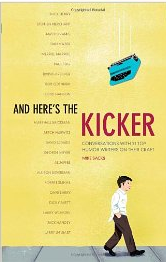I recently read “How To Audition for TV Commercials: From the Ad Agency Point of View” by W.L. Jenkins. I recommend this book as an addition to taking a commercial class or doing one on one coaching. Here are the quotes I found must useful:
“If you treat every part as if it were a big one, you’ll book lots of small ones.” (1)
“Ad agencies and directors want to see someone that we believe. We want somebody who is that person in the commercial.” (4)
“If you come in and you’re not as serious as we are, then we don’t want you!” (7)
“The final decision between you and another talented actor who looks just as right for the part as you do may not be about being right for the part at all. It may come down to, “are you a person we want to work with?” An actor who seems to be taking the situation lightly isn’t somebody we want to work with.” (7)
“If your motivation comes purely from the idea that this looks like an easy way to make a few bucks, then you won’t last very long.” (8)
“What happens in that audition studio is really more important than what happens in the commercial.” (8)
“Every character written into any TV commercial, directly or indirectly, has something to do with what’s being sold. They know how they fit in with that program without actually being a salesperson.” (10)
“Dorothy Kelly looks for “a feeling of confidence. A feeling that the person is a professional. Someone who knows what they’re doing so there’s that certain bearing. That the person is in control.” (11)
“One of the things that hindered me as an actor was that I got so hung up on who I thought I wanted people to think I was that I forgot who I was.” (15)
“Advertising is a cutthroat business where agencies spend a lot of time landing a client and, once they ge tone, spend the rest of their time trying not to lose it.” (20)
“Advertising people don’t have much time to get things done, so the one thing that you don’t want to do as an actor is waste their time at an audition.” (20)
“Brand personality. Target market. Tone and manner. These three advertising elements are the DNA of a brand, and therefore, elements that are at the heart of a commercial.” (26)
“You’re always going to be confronted by scripts that don’t track. What do you do there? The best thing is to roll up your sleeves and look for the concept.” (29)
“The creative team wants to know, “Is this ad honest? … Believable? … Clear? … Memorable? … And lastly, they want to know: if we replaced our client’s logo at the end of the spot with one of our competitors, could they say the same thing we’re saying?” (31)
“As far as the client is concerned, their product is the star of the commercial, not you.” (39)
“A TV commercial concept will be directly related to the prospect of either selling something or creating a strong bond between the target market and the advertiser.” (43)
“One giveaway to a brand’s personality is its slogan.” (45)
“Reading for an advertiser where you’ve discovered the style of music they use in their ads could be helpful.” (47)
“Don’t Sell! Actors who can deliver “selly” ad copy without selling are number one in my book.” (51)
“Look for the approval date at the top of the script. That date – or its revision number – is your clue to a change in the commercial.” (58)
“MOS means filming without sound.” (61)
“The best way to play misdirection is with honest conviction.” (69)
“When scenes look short, that doesn’t mean that when you read, you must rush to do them in the allotted time.” (70)
“If they don’t include the name of the advertiser, ask who it is. If they don’t tell you what’s being advertised – a product or a service – find that out, too.” (107)
“It will be infinitely more helpful if you know something about the director’s style and the kind of spots he directs before you go to the initial call.” (108)
“Speak to the casting director or have your agent speak to the casting director and ask, ‘What types of spots does this director do? Is he a comedy director? Is he a drama director? Is he a people director?’” (109)
“When you put on any of these [audition] outfits, it should look like something you wear all the time.” (112)
“If you make it to the callback, wear the same clothes you wore to the audition. That little bit of recognition can go a long way.” (112)
“Never, never wear read; red bleeds on videotape.” (115)
“Don’t ask acting questions like, “What’s my motivation?”” (120)
“Be sure to find out when the callback is being held and when the spot is shooting.” (121)
“Believe that they’re looking for you.” (122)
“Ask if you’re being paired with someone. If so, find someone to run lines with, even if you’re not going to go in with them.” (123)
“The reason there are so many bad commercials on TV is that the scripts are bad to begin with, and only bad actors are willing to sacrifice their integrity to work in them.” (124)
“If you look at the script and think, “This is terrible! I’m not going to do this!” then go to the casting assistant or casting director and politely tell them that you’ve just gotten a call from day care about your kid (or some plausible excuse) and that you’re sorry but you can’t audition. Don’t tell them the spot stinks!” (124)
“The worst thing an actor can do is turn down the spot after he or she gets cast.” (124)
“While in the waiting area, find some place to read the copy out loud so that the first time it comes out of your mouth isn’t when you’re in the studio… If you’re going to go in to read soon, stand up. Stay on your feet so that you can maintain your energy.” (125)
“Always have a jacket and a tie with you so you can switch wardrobe. Likewise, have a ball cap and a denim jacket available.” (126)
“When you pick up the material, you must ask, what can I add to this to make them need me? Why do they need me? .. the most successful people in the business have this attitude: ‘What can I bring to this?’ Every script is a puzzle to solve, a game you can play to try to figure out what you can do with the material. The worse the commercial, the more work you should be doing to make it better.” (128)
“Whether you think it’s the wrong one of the right one, come in with a choice. Even if it’s wrong, you’re better off than having no choice at all.” (130)
“If you decide to make weird script interpretations or do something off the wall purely because you feel it’ll make an impression, that’s a bad choice. Make choices based on the truth you see in the scripts.” (131)
“Slate as yourself because good directors are always looking under the skin for the real person inside. According to director Danny Levinson, “If you slate your name and go into character they can see where you can go. If you’re automatically the character they never know where you started.” (133)
“Turning a line or lines, or a piece of business, into a statement that is overtly “selly” is the mark of an amateur… The last thing we want to see is someone selling something… Unless directed otherwise, please resist the temptation to hammer on lines like these.” (135)
“When you blow a line, or get lost or bobble a prop and you have the presence of mind to keep on going, after you finish it would be appropriate to say, “I know I screwed that line up there,” or, “Obviously I klutzed that prop, so would it be all right if I gave it another shot?”” (139)
“Even if you’re really pissed about being interrupted, don’t show it. Ever. Because if you do, then the director will feel that on the shoot, which is infinitely more chaotic than an audition, you won’t be able to handle it.” (139)
“One of the main reasons the same actors get hired over and over is because they’re cool and flexible; i.e., they’re reliable.” (140)
“Some of the better directors have worked with certain actors, and they’ll alert us to watch out for somebody they like. “Hey, keep an eye out for so-and-so. I worked with her and she’s really good.” An endorsement like that can color our opinion in such a way that even though this anointed talent didn’t really perform well, the director will make us feel that, “look, even if you didn’t see it today, this girl’s gonna do better than anybody else we saw.” In a case like that, it’s a lock that that actor is going to be called back – even if she doesn’t look right for the part.” (147)
“Michael Norman says, “Something I tend to do is, I may see somebody on an initial tape and I’ll think, ‘They’re totally wrong for this, but they’re an interesting character and a good actor.’ And I’ll bring them back to the callback just because I want to meet them. And I’ll want to get their Polaroid and save it for something else, ‘cause I think they’re interesting and I’ve never seen ‘em before. An actor may come in and feel like, ‘Why did they call me back for this? My agent sends me and I’m totally wrong and I don’t get it.’ Well, it may be that the director is interested in your for something you never even thought of.”” (149)
“The best actors I’ve worked with have either been highly intelligent, or they simply are the character that I’m looking for – in which case they don’t have to be intelligent, but they do have to be reasonably good at taking direction.” (150)
“There’s an air about true professionals – they seem to be in complete control, yet so loose at the same time. It’s immediately apparent that they’ve done their homework and that they’re comfortable in the situation. When we see that, our comfort level instantly moves into the warm zone.” (151)
“No matter what, try not to pick up on the energy of the room. Even if it appears that we’re dealing with some kind of bad mojo, don’t play into it.” (156)
“Bernard Hiller recommends doing this: “When you walk in, you’re not walking in to audition. See yourself as going into the shoot. It’s a different attitude. You’re not trying out anything. You’re there already. You’re part of the team, so you’re going in to meet people who are already crazy about you. And even if they look really serious, that’s how people look when they’re really crazy about you.” (156)
“Forget about all the other people in the room. Take focus and seek the director’s attention.” (157)
“If you say, ‘You know, this is a cute script. I like this,’ it sort of breaks the ice and they’ll say, ‘Do you want to take a pass at it?’” (157)
“Actors being too friendly turns me off.” (159)
“The director may decide to push you in a different direction just to see how you handle it.” (159)
“If a director likes you, he may ask for a take that’s a little forced, just so he has something safe to use to sell you to the client.” (161)
[At a callback] “Before they being, they strike out by not asking, “What is it that you’d like me to do?” Don’t ever assume. Just ask and you’ll have begun your dialogue with the director.” (162)
“As soon as somebody gives direction, the actor’s next job is to ask, “What do you mean? Do you mean like this?”” (162)
“It’s the job of the talent to enable the director to start the casting session as quickly as possible. So a crucial quality is the ability to listen.” (164)
“Never show off in the session. Don’t show off during the slate. Don’t draw attention to yourself by being a smart aleck. Don’t try and humor the agency or the casting director. Everybody’s trying to do that. The way to get noticed is to draw attention to yourself by being quiet, highly attentive, and charming. If you quietly communicate that quality, people will notice you.” (165)
“Don’t feel that, by staying longer in the room, you’ll in any way increase your chances of getting the job. On the contrary, you probably reduce your chances.” (165)
[In a callback] “I want to reassure what they did in the initial casting and see if they can duplicate that. It’s very interesting that some people have no clue what they did.” (166)
“Pros just say, ‘Higoodtaseeya,’ and then they get on with the work. No schmoozing, no war stories, just focus – ask the director a good question about the part and go to work.” (169)
“One sure way to lose a part is to play to the director or someone else in the room you think is important.” (169)
“After your audition, hang around for a minute or two in the waiting area.” (172)
“Be yourself, and you’ll find your niche. Or rather, the niche will find you.” (175)
“Headshots and those materials just get thrown away. Agency and production people just toss your stuff in the trash because they’re so busy creating and managing advertising that they don’t have time to pay attention to actors. That’s why casting directors were created, and they should be the focus of your personal advertising campaign.” (180)





